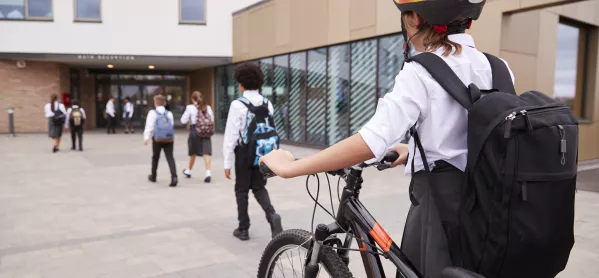Covid: Record 1.1 million pupils absent from school

A record 1.13 million pupils in England were out of school for Covid-19 related reasons on a single day, new government figures show.
Around 1,126,000 pupils were unable to attend school on 16 July because of the pandemic, compared with 859,000 on Friday 9 July, according to Department for Education (DfE) statistics.
Related: North of England hardest hit by Covid school absence
Covid: Attendance in secondary school dropped as low as 14 per cent in the final week of term
The start of term: Boris Johnson insists schools are safe as primaries reopen
The figures include 994,000 pupils self-isolating owing to a possible contact with a Covid-19 case, 48,000 pupils with a confirmed case of coronavirus and 33,300 with a suspected case.
A further 50,700 pupils were off as a result of school closures owing to Covid-related reasons.
The DfE survey, which has been recording daily attendance in schools over the past year, closed on 16 July, when the number of pupils absent from class because of Covid-19 reached a record high since all students returned in March.
The government’s rules had said that pupils have to self-isolate for 10 days if another pupil in their bubble - which can be an entire year group at secondary school - tests positive for coronavirus.
But education secretary Gavin Williamson announced that the use of “bubbles” in schools in England was coming to an end as the country eased lockdown restrictions last week.
Mr Williamson said it was up to individual schools and colleges whether they scrapped the bubble system ahead of the summer holidays, following the move to step 4 of the road map.
From 16 August, pupils in England will only need to self-isolate if they have tested positive and close contacts will be asked to take a PCR test.
A study released last week found that daily testing of pupils who have been in contact with someone with Covid-19, rather than isolating whole groups, may be just as effective in controlling transmission in secondary schools.
Researchers at the University of Oxford estimated that daily Covid-19 testing in schools - as an alternative to the current 10-day contact isolation policy - can reduce coronavirus-related school absences by 39 per cent.
The DfE also released a regional breakdown of absences in state schools in England - which have been adjusted to exclude those Year 11-13 students not expected to attend because they are off site - from 10 June to 15 July.
The highest rate of Covid-related absence was more than one in four (26.5 per cent) in the North East on 15 July, while London had the lowest (9.6 per cent).
The North East also had the highest staff absences on 15 July, with 11.1 per cent of teachers and school leaders - and 11 per cent teaching assistants or other staff - absent for Covid-related reasons.
This compares with 6.6 per cent of teachers and school leaders - and 6.4 per cent teaching assistants or other staff - absent for Covid-reasons nationally on 15 July.
Geoff Barton, general secretary of the Association of School and College Leaders (ASCL), said: “This data shows very starkly that it has been an extremely challenging end to an extremely challenging school year.
“Two things must happen. One, the government must put a much greater focus on putting an end to educational disruption in the autumn term and provide more support to schools and colleges.
“Two, it must also provide a much more ambitious and better funded recovery plan to address the learning loss experienced by many pupils during the pandemic.
“The plans it has announced so far are a long way short of what is needed by children and young people.”
You need a Tes subscription to read this article
Subscribe now to read this article and get other subscriber-only content:
- Unlimited access to all Tes magazine content
- Exclusive subscriber-only stories
- Award-winning email newsletters
Already a subscriber? Log in
You need a subscription to read this article
Subscribe now to read this article and get other subscriber-only content, including:
- Unlimited access to all Tes magazine content
- Exclusive subscriber-only stories
- Award-winning email newsletters



